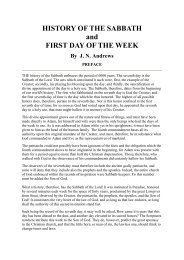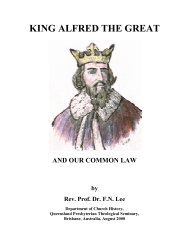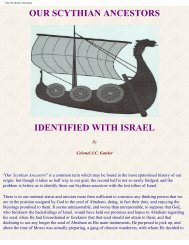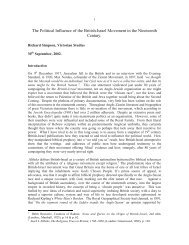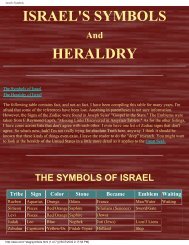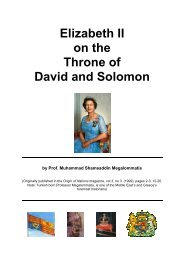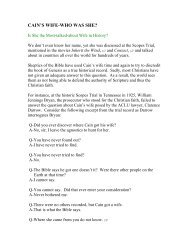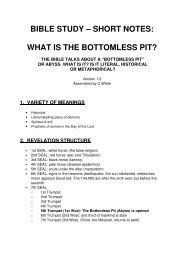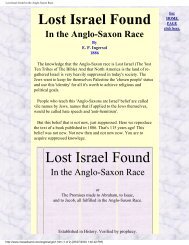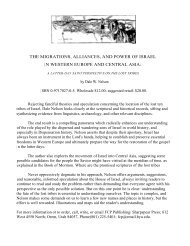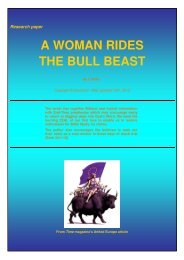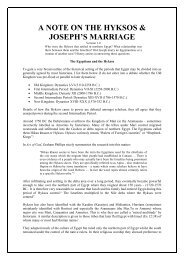The Throne of Britain: Its Biblical Origin and Future - Origin of Nations
The Throne of Britain: Its Biblical Origin and Future - Origin of Nations
The Throne of Britain: Its Biblical Origin and Future - Origin of Nations
You also want an ePaper? Increase the reach of your titles
YUMPU automatically turns print PDFs into web optimized ePapers that Google loves.
particularly if he ever referred to Jeremiah as “my father.” If Jeremiah was Ollam Fodhla, we can<br />
perhaps see how Baruch was later considered his descendant.<br />
<strong>The</strong>re is further confusion over the identity <strong>of</strong> Heremon or Eremon. He is <strong>of</strong>ten said to be the<br />
son <strong>of</strong> Milesius but is sometimes identified as Milesius himself. Furthermore, there is, as mentioned, a<br />
Gede or Ghede who seems to be synonymous with Heremon. It is sometimes stated that Heremon had<br />
a son named Heremon. This name, a Hebrew derivative that may have meant something like<br />
“highest” (see Milner, p. 11 footnote), could have become a title for the Irish high king—similar t o<br />
Eochaidh being a general term for prince. Thus, no matter what the actual name <strong>of</strong> the king at the<br />
time <strong>of</strong> Jeremiah, he may have been referred to both as Eochaidh <strong>and</strong> Heremon. Tea is reputed to<br />
have married Gede “the Heremon” by some accounts.<br />
<strong>The</strong>re is another possibility regarding the name Heremon that is rather astounding t o<br />
contemplate. For the Hebrew derivation just mentioned is reckoned from the root ruwm, meaning<br />
“high . . . l<strong>of</strong>ty . . . exalted” (Enhanced Strong’s Lexicon, No. 7311). And this root forms the name<br />
<strong>of</strong> a well-known Hebrew name—Jeremiah! His name, broken down as Yerem-Yah, is understood t o<br />
mean “Exalted by the Eternal” or “Appointed by the Eternal” (No. 3414). In Greek his name is<br />
Ieremias. In Spanish his name is pronounced Heremias. With the Celtic augmentative suffix, this<br />
would become Heremion or Heremon.<br />
So it just may be that Jeremiah’s name appears in the Irish annals after all—<strong>and</strong> that his name<br />
became confused with his contemporaries. If so, then Heremon was not actually the name <strong>of</strong> the<br />
husb<strong>and</strong> <strong>of</strong> Zedekiah’s daughter—although it could have been the name <strong>of</strong> their son. For as important<br />
as Jeremiah was, it would not be at all surprising to find that others, particularly in the royal family,<br />
were named after him. In any event, it is interesting to consider that, as one source has put it,<br />
“Heremon <strong>and</strong> Ollam Fola are mingled together in hopeless confusion” (Matthew Kelly, 1848,<br />
translation notes accompanying John Lynch’s Cambrensis Eversus, 1662).<br />
If Heremon or Eremion is the Irish form <strong>of</strong> Jeremiah, this could give us another possible origin <strong>of</strong><br />
the name Eire or Ire-l<strong>and</strong>. Indeed, it could explain why Irel<strong>and</strong> has been called Jeremy’s L<strong>and</strong>. For<br />
Irel<strong>and</strong> would actually mean “Jeremiah’s L<strong>and</strong>”—the l<strong>and</strong> <strong>of</strong> Jeremiah! Yet it must still be kept in<br />
mind that the name Heremon became attached to the first Milesian king <strong>of</strong> Irel<strong>and</strong>, whether or not<br />
that was his actual name.<br />
Tea-Tephi or Scota<br />
Concerning the names Tea, Tephi <strong>and</strong> Tamar, while they may refer to the same person at the<br />
time <strong>of</strong> Jeremiah, it is also possible that they do not. In favor is the fact that these names are<br />
sometimes linked together in old Irish poems. Moreover, these appellations, meaning what they did<br />
in Hebrew, could possibly have been applied to a Hebrew princess accompanying Jeremiah even if<br />
they were not her actual names—stories about her, then, may have confused her with other women.<br />
Also in favor is that if the other names mentioned were aligned with Jeremiah, she would fall into<br />
place as well.<br />
And there is another possible explanation regarding her identity. One <strong>of</strong> the primary Irish<br />
chronicles, <strong>The</strong> Annals <strong>of</strong> the Kings <strong>of</strong> Irel<strong>and</strong> by the Four Masters, mentions “Tea, daughter <strong>of</strong><br />
Lughaidh, son <strong>of</strong> Itha, whom Eremhon married in Spain” (1636, Vol. 1, p. 31). At first glance, this<br />
would seem to rule out her being the daughter <strong>of</strong> Zedekiah. However, Lughaidh may not refer to an<br />
actual person. <strong>The</strong> Irish are referred to as the “race <strong>of</strong> Lughaidh” <strong>and</strong> Irel<strong>and</strong> as “the l<strong>and</strong> <strong>of</strong><br />
Lughaidh”—“one <strong>of</strong> the many arbitrary bardic names for Irel<strong>and</strong>” (Annals <strong>of</strong> the Four Masters, Vol.<br />
6, appendix).<br />
Lughaidh in old Gaelic could mean “House <strong>of</strong> God”—broken down as Logh, “God,” <strong>and</strong> aidhe,<br />
“house, habitation, fortress” (Edward O’Reilly, An Irish-English Dictionary, 1821, 1864). “House <strong>of</strong><br />
God” (Hebrew Beth-El) may have been a designation for David’s dynasty or even for the “large,<br />
rough stone” reportedly brought by Jeremiah (see Appendix 7: “<strong>The</strong> Stone <strong>of</strong> Destiny”). <strong>The</strong> word<br />
Lughaidh may also come from lugha or lughadh, meaning “oath”—apparently because it invokes<br />
God (O’Reilly, note by editor John O’Donovan, p. 671; N. MacLeod <strong>and</strong> D. Dewar, A Dictionary <strong>of</strong><br />
the Gaelic Language, 1831, 1909)—<strong>and</strong> could be related to God’s oath to David.<br />
<strong>The</strong> name Itha or Ith may mean “crown,” as does the related Welsh yd (O’Reilly). Ith, coming<br />
from Spain, is said to be the son <strong>of</strong> Breoghan in some accounts, but this may simply be because the<br />
Milesian line <strong>of</strong> kings came to Irel<strong>and</strong> from Brigantium (modern Corunna near Santiago de<br />
Compostella) on the northwest coast <strong>of</strong> Spain. Indeed, Tea is in at least one old poem called Temor<br />
- 17 -



